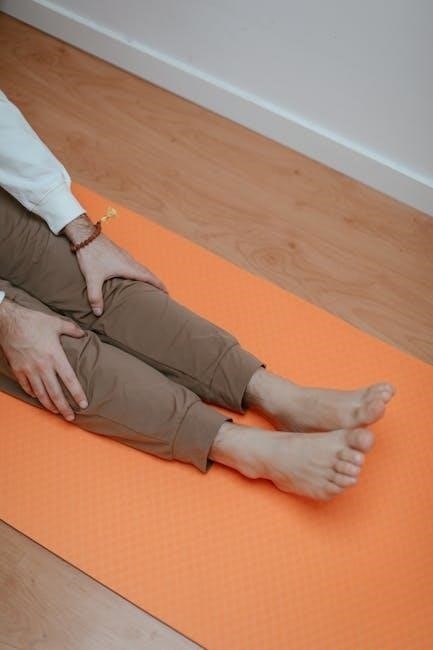Spiritual exercises are practices designed to deepen spiritual awareness‚ foster inner peace‚ and align one’s life with divine will‚ rooted in reflection and mindfulness.

1.1 Definition and Purpose of Spiritual Exercises
Spiritual exercises are structured practices‚ including meditations‚ prayers‚ and reflections‚ designed to deepen spiritual awareness and foster inner transformation. Their purpose is to help individuals seek and align with the divine will‚ guiding life decisions for the greater good. These exercises‚ rooted in traditions like those of St. Ignatius of Loyola‚ aim to cultivate mindfulness‚ self-awareness‚ and a deeper connection with one’s faith. By engaging in these practices‚ individuals can clarify their intentions‚ seek divine grace‚ and embrace a life of purpose and meaning.

1.2 Historical Background and Evolution
Spiritual exercises trace their origins to ancient religious and philosophical traditions‚ with significant contributions from figures like St. Ignatius of Loyola. His Spiritual Exercises‚ developed in the 16th century‚ laid the groundwork for structured spiritual practices aimed at discernment and divine alignment. Over centuries‚ these exercises have evolved‚ integrating elements from various cultures and religions‚ such as Buddhist meditation and mindfulness practices. Today‚ they remain a cornerstone of Christian spirituality while adapting to modern needs‚ offering a timeless framework for personal growth and spiritual enrichment in daily life. Their enduring relevance speaks to their universal appeal.

Importance of Spiritual Exercises in Daily Life
Spiritual exercises foster mindfulness‚ inner peace‚ and alignment with moral values‚ enhancing mental well-being and guiding actions for a purposeful‚ compassionate‚ and meaningful life.
2.1 Enhancing Mental and Emotional Well-Being
Spiritual exercises‚ such as meditation and prayer‚ help reduce stress and improve mental health by fostering mindfulness and emotional resilience. Regular reflection and journaling enable individuals to process emotions‚ gain clarity‚ and cultivate gratitude. These practices align actions with moral values‚ promoting a sense of purpose and balance in life. By focusing on inner peace and connection to a higher power‚ spiritual exercises empower individuals to navigate life’s challenges with greater calm and confidence‚ leading to enhanced emotional well-being and overall life satisfaction.
2.2 Aligning Actions with Moral and Spiritual Values
Spiritual exercises guide individuals to align their actions with moral and spiritual values‚ fostering integrity and purpose. Practices like meditation‚ prayer‚ and reflection encourage self-awareness‚ helping people evaluate their choices and intentions. By connecting with a higher purpose‚ individuals are more likely to act compassionately and ethically. These exercises also promote mindfulness‚ enabling intentional decisions that reflect personal beliefs. Regular spiritual practice strengthens moral clarity‚ leading to a life of authenticity and harmony with one’s values‚ which enhances relationships and overall life satisfaction.
Key Principles of Spiritual Exercises
Spiritual exercises emphasize mindfulness‚ intention‚ and self-reflection to deepen inner awareness and connection with a higher purpose‚ fostering personal growth and holistic well-being.
3.1 Mindfulness and Presence in Daily Activities
Mindfulness and presence are core principles of spiritual exercises‚ encouraging individuals to fully engage with the present moment; By focusing on thoughts‚ emotions‚ and sensations without judgment‚ one cultivates awareness and clarity. This practice transforms routine tasks‚ such as eating or walking‚ into opportunities for spiritual growth. Presence fosters gratitude‚ reduces stress‚ and enhances emotional resilience. Regular mindfulness practice helps individuals connect with their inner selves‚ aligning actions with their values and fostering a deeper sense of purpose and fulfillment in daily life. This mindful approach nurtures spiritual well-being.
3.2 Cultivating Gratitude and Positivity
Cultivating gratitude and positivity is a powerful spiritual exercise that transforms daily life. By focusing on the good in every situation‚ individuals shift their perspective‚ fostering joy and contentment. Practices like gratitude journaling‚ where one writes down things they are thankful for‚ help rewire the mind to appreciate life’s blessings. Sharing gratitude with others strengthens relationships and creates a ripple effect of kindness. This practice not only enhances emotional well-being but also deepens spiritual connection‚ encouraging a heart of thanksgiving and positivity in all circumstances. Regular gratitude practice nurtures a more fulfilling and meaningful life.
3.3 The Power of Reflection and Self-Awareness
Reflection and self-awareness are essential spiritual exercises that deepen understanding of oneself and life’s purpose. By regularly examining thoughts‚ emotions‚ and actions‚ individuals gain clarity and alignment with their values. Practices such as meditation‚ journaling‚ and silent contemplation foster self-awareness‚ enabling personal growth and spiritual evolution. Reflection helps identify patterns‚ release negativity‚ and embrace mindfulness. This practice cultivates humility‚ wisdom‚ and inner peace‚ transforming daily experiences into opportunities for profound spiritual insight and connection with one’s true self and the divine. Regular reflection strengthens the foundation for a meaningful and purpose-driven life.

Practical Applications of Spiritual Exercises
Practical spiritual exercises integrate mindfulness‚ meditation‚ and prayer into daily routines‚ fostering emotional balance‚ clarity‚ and alignment with moral values for holistic well-being effectively.

4.1 Morning Meditation and Prayer Practices

Starting the day with meditation and prayer sets a positive tone‚ fostering clarity and purpose. These practices involve setting intentions‚ deep breathing‚ and connecting with a higher power. They help cultivate mindfulness‚ gratitude‚ and emotional balance‚ preparing individuals to face challenges with resilience. Consistent morning rituals enhance mental focus‚ reduce stress‚ and align actions with spiritual values‚ promoting overall well-being throughout the day. Incorporating these exercises into daily routines strengthens spiritual growth and provides a foundation for meaningful living.
4.2 Incorporating Mindful Breathing in Daily Tasks
Mindful breathing is a powerful spiritual exercise that can be seamlessly integrated into daily activities. By focusing on intentional breaths‚ individuals can reduce stress‚ enhance concentration‚ and create a sense of calm. Simple techniques like inhaling deeply for four counts‚ holding for four‚ and exhaling for six can be practiced during work‚ while commuting‚ or even during chores. This practice fosters mindfulness‚ improving emotional regulation and overall well-being. Regular mindful breathing helps maintain spiritual alignment and balance‚ making it an accessible yet profound daily spiritual exercise for everyone.
4.3 Journaling for Spiritual Growth and Clarity
Journaling is a profound spiritual exercise that fosters self-reflection and introspection. By documenting thoughts‚ emotions‚ and experiences‚ individuals can gain clarity on their spiritual journey. This practice helps identify patterns‚ process emotions‚ and align actions with spiritual values. Regular journaling also serves as a tool for gratitude‚ encouraging positivity and mindfulness. Over time‚ it becomes a sacred space to track progress‚ celebrate growth‚ and deepen spiritual awareness. Consistent journaling nurtures a deeper connection with oneself and the divine‚ promoting personal transformation and inner harmony.

Benefits of Regular Spiritual Practice
Regular spiritual practice fosters inner peace‚ enhances mindfulness‚ and promotes emotional resilience. It encourages a positive outlook‚ aligns actions with values‚ and brings fulfillment to life.
5.1 Building Emotional Resilience and Inner Peace
Spiritual practices like meditation and mindfulness help develop emotional resilience‚ enabling individuals to navigate life’s challenges with calmness and clarity. Regular reflection and prayer foster inner peace by creating a sense of connection to oneself and the universe. These exercises teach acceptance and empathy‚ reducing stress and anxiety. By cultivating self-awareness‚ individuals can better manage emotions‚ leading to harmonious relationships and a balanced life. Spiritual practices also encourage gratitude‚ which strengthens mental well-being and provides stability during difficult times‚ promoting long-term emotional and spiritual growth.
5.2 Improving Relationships Through Compassion
Spiritual exercises such as meditation‚ prayer‚ and reflection cultivate compassion‚ fostering deeper connections with others. By practicing empathy and understanding‚ individuals can communicate more effectively and resolve conflicts peacefully. These practices encourage selfless acts of kindness‚ creating a ripple effect of positivity in relationships. Spiritual growth also enhances patience and tolerance‚ leading to more harmonious interactions. Compassion‚ rooted in spiritual values‚ strengthens bonds and builds supportive communities‚ promoting a culture of love‚ respect‚ and mutual understanding in all interactions.
5.3 Finding Purpose and Meaning in Life
Spiritual exercises help individuals discover their life’s purpose by fostering self-reflection and introspection. Practices like meditation and prayer encourage a deeper connection to one’s values and passions. By aligning actions with spiritual beliefs‚ people often experience a sense of direction and fulfillment. Regular spiritual reflection clarifies life goals‚ enabling individuals to pursue meaningful paths. This alignment enhances overall satisfaction and contributes to a life of purpose‚ guiding decisions that resonate with personal and spiritual aspirations.
Challenges in Maintaining Spiritual Practices
Maintaining spiritual practices can be challenging due to busy schedules‚ lack of motivation‚ and distractions from daily life‚ making it difficult for many individuals to find consistency.
6.1 Overcoming Distractions and Busy Schedules
Modern life often brings distractions and hectic schedules‚ making it difficult to maintain spiritual practices. To overcome this‚ prioritize spiritual exercises by integrating them into daily routines‚ such as during commutes or breaks. Time management techniques‚ like setting aside specific moments for meditation or reflection‚ can help. Additionally‚ simplify practices to fit into busy days‚ such as short mindfulness exercises or brief prayers. Consistency is key‚ even if sessions are brief. Start small and gradually build a sustainable routine that aligns with your lifestyle.
6.2 Dealing with Doubt and Spiritual Dryness
Doubt and spiritual dryness are common challenges that can hinder spiritual growth. Acknowledge these feelings as natural parts of the journey rather than signs of failure. Reflect on core beliefs and reconnect with initial motivations for spiritual practice. Seek guidance from mentors or spiritual texts for renewed inspiration. Sometimes‚ adjusting practices or exploring new exercises can reignite passion. Remember‚ persistence is key—even small‚ consistent efforts can help navigate periods of doubt and foster deeper understanding over time.

Spiritual Exercises Across Cultures and Religions
Spiritual exercises vary widely across cultures and religions‚ reflecting diverse traditions and beliefs. Practices like meditation‚ prayer‚ and mindfulness are universal‚ fostering connection and inner growth.
7.1 Ignatian Spirituality and Its Contributions
Ignatian spirituality‚ rooted in the teachings of St. Ignatius of Loyola‚ emphasizes a deep‚ personal relationship with God. Its core practices‚ such as the Spiritual Exercises‚ guide individuals in discernment‚ prayer‚ and reflection. By fostering mindfulness and gratitude‚ Ignatian spirituality helps integrate faith into daily life‚ encouraging individuals to find God in all things. This tradition also promotes self-awareness and purpose‚ enabling believers to align their actions with divine will and cultivate inner peace amidst life’s challenges.
7.2 Buddhist Meditation Practices for Daily Life
Buddhist meditation practices‚ such as mindfulness and loving-kindness meditation‚ offer practical tools for spiritual growth. These exercises cultivate awareness‚ compassion‚ and inner peace. Techniques like breath focus and body scans help individuals stay present‚ reducing stress and enhancing clarity. Regular practice fosters emotional balance and resilience‚ allowing one to navigate life’s challenges with greater ease. By integrating these practices into daily routines‚ individuals can embrace a mindful and compassionate lifestyle‚ aligning their actions with spiritual values and promoting overall well-being.
Spiritual exercises offer transformative tools for fostering inner peace‚ emotional resilience‚ and purpose. Consistent practice cultivates mindfulness and alignment with higher values‚ enriching daily life profoundly.
8.1 Summarizing the Role of Spiritual Exercises
Spiritual exercises play a vital role in integrating mindfulness‚ reflection‚ and purpose into daily life. They help individuals connect with their inner selves and align actions with moral values. By fostering resilience‚ clarity‚ and compassion‚ these practices enhance overall well-being. Whether through meditation‚ journaling‚ or prayer‚ spiritual exercises offer practical tools for navigating life’s challenges. Their versatility across cultures and traditions makes them universally accessible‚ providing a path to deeper fulfillment and harmony in everyday experiences.
8;2 Encouraging Consistency in Spiritual Practices
Consistency in spiritual practices is key to fostering lasting transformation. Establishing a daily routine‚ even for a few minutes‚ helps create a sustainable habit. Setting clear intentions and scheduling spiritual exercises in your daily planner can enhance commitment. Starting small and gradually increasing practice depth ensures accessibility. Surrounding yourself with supportive communities or accountability partners can also motivate adherence. Celebrating progress‚ no matter how minor‚ reinforces the value of these practices‚ making consistency more achievable and rewarding over time.
Additional Resources for Spiritual Growth
Explore books‚ PDF guides‚ and online workshops to deepen your spiritual journey. Join communities for support and access practical tools for daily practice and growth.
9.1 Recommended Books and PDF Guides

Discover transformative books and PDF guides that offer practical spiritual exercises for daily life. Titles like “The Spiritual Exercises of St. Ignatius” provide structured reflection techniques‚ while “Mindfulness in Daily Life” offers meditation practices. “The Power of Now” by Eckhart Tolle and “The Art of Living” by Thich Nhat Hanh are essentials for cultivating presence. Additionally‚ downloadable PDF guides like “Daily Spiritual Practices for Inner Peace” and “Meditation for Beginners” provide accessible routines. These resources empower individuals to integrate spirituality into their busy lives effectively.
9.2 Online Communities and Workshops
Engage with online communities and workshops to deepen your spiritual practice. Platforms like InsightTimer and Calm offer guided meditations and live sessions. Websites such as SpiritualExercises.net provide interactive workshops on mindfulness and breathwork. Join forums like Reddit’s r/Spirituality to connect with others on similar journeys. These resources foster growth‚ accountability‚ and inspiration‚ helping you stay consistent with spiritual exercises in daily life. Many workshops are free or low-cost‚ making them accessible to everyone seeking to enrich their spiritual practice.



